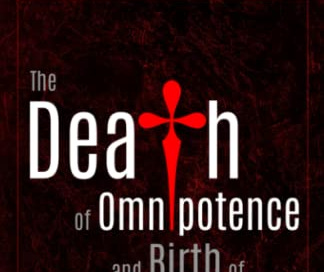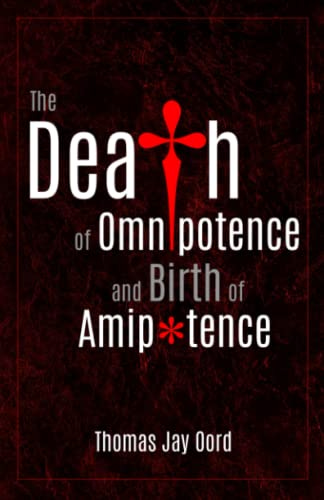The Death of Omnipotence:
A Book Review
Thomas Jay Oord’s new book The Death of Omnipotence and the Birth of Amipotence makes bold claims about the power of God as understood in the term omnipotent. Oord contrasts omnipotence with the word he has coined: amipotence which Oord coined to “stress the priority of love over power in God.” (120) As a Wesleyan-Holiness theologian, the idea of starting with love is crucial. Oord has also undertaken the oft neglected task of defining love itself, which he does in depth in his book Pluriform Love. But for The Death of Omnipotence the focus is upon making the case that the very idea of omnipotence is not scriptural. Oord rightly asserts that the word omnipotent does not appear in scripture (although the King James Translation translates pantokrator as omnipotent in Rev 19:6. This is an exception to every other English translation I surveyed including the 1599 Geneva Bible). Of course, perhaps the word Almighty is a match for omnipotence, but Oord deals with that claim. Perhaps almighty and omnipotent are similar, but do not carry the same connotation.
Dealing with omnipotent itself, Oord lists three meanings that derive from the word omnipotent:
“1. God exerts all power.
2. God can do absolutely anything.
3. God can control others or circumstances.” (3)
Christians may agree to one or all of these phrases, but even then most end up having to add qualifications to the statement that God is omnipotent. Oord calls this the “death of a thousand qualifications.” Out of the gate, if we ask most Christians can God sin, the answer would be no, which qualifies God’s power. To argue that omnipotence is the improper idea behind what is often translated almighty, Oord does word studies upon the two Hebrew words which get translated as almighty and then the Greek word which is chosen to translate those from the Hebrew scriptures into the Greek Septuagint which was used in Jesus’ day. The words are shaddai, saboath in Hebrew and pantokrator in Greek. This dive into the words and translation of those words makes for an interesting argument.
Oord deals with passages which are often used to derive the meaning of omnipotence as well. “No biblical words literally mean “omnipotent,” “almighty,” or “all-powerful.” If portraying God as omnipotent were as important as many think, one would expect writers of sacred writ to use words that straightforwardly mean omnipotent. They don’t. However, a person might claim the meaning of these words are present in the Bible. Perhaps biblical authors believe God is omnipotent but don’t use words that explicitly say so. We need to explore this possibility.” (25)
Within the framework of Wesleyan-Holiness theology, the idea of power for God is always influenced by the fact that God’s very nature and character are love. For the Wesleyan, to say God is sovereign, is to say that God’s sovereignty is expressed in love. To say that God is powerful is to say that God’s power is expressed in love. This is the tradition in which Oord is working and why his rejection of the common understanding of omnipotence is cogent and logical.
Oord explains his move from the negative to his replacement for omnipotence in amipotence. For the Wesleyan, the idea of God as omnipresent, active, and relational is key. “I go beyond what God can’t do to explain what an amipotent God can. This loving God acts moment by moment, exerting causal influence throughout creation. God creates, sustains, saves, and transforms. Nothing and no one is more influential; the uncontrolling love of an amipotent God is universally active and everlasting. But the flourishing God desires requires creaturely contributions and conducive conditions in creation. A loving God needs us, because love is relational.” (10)
Our experience of God and God’s creation bears out the idea of amipotence as superior to omnipotence. In the final section, Oord describes the concept of amipotence and shows its effect. “The “potence” of amipotence pertains to God’s influence. Divine power is immensely more influential than creaturely power. God is more powerful, in part, because an omnipresent God affects all creation. God’s love is more powerful because it is everlastingly relentless; it never ends. The power of amipotence is active and receptive, empowering and empathetic, wooing but persistent, and always uncontrolling. Divine love is literally the most powerful force in the universe.” (125)
As with most of Tom Oord’s work, this book makes us think through the implications of our words and actions. How does the idea of omnipotence impact our theological statements and beliefs? Is amipotence the more interesting argument? I believe so, but recommend the book be picked up and read to see the entire argument and understand the relational and immanent understanding of God. Amipotence works within an idea that God is transcendent in God’s immanence. The Gospel narrative proves this because the incarnate and eternal Logos becomes flesh. In the immanence of incarnation, we witness the fullness of the revelation of God. the letter of First John hammers home the nature of God as love in the powerfully simple phrase “God is love.”
Disclaimer: I received an advanced copy of The Death of Omnipotence and the Birth of Amipotence. In addition, I was on a team of people who were asked to give feedback on an early draft of the book minus the conclusion. But I also purchased a digital copy of the book for my library. No expectation of a positive review was presented, and no one previewed this review prior to its publication.
Subscribe to Parson Brown
Faith and Sundries





